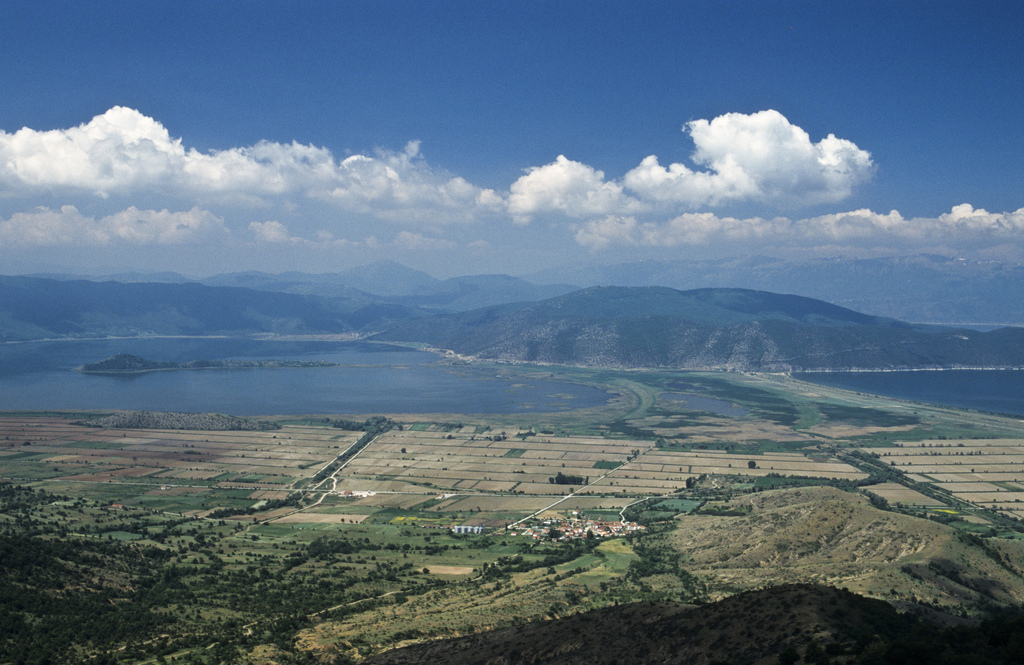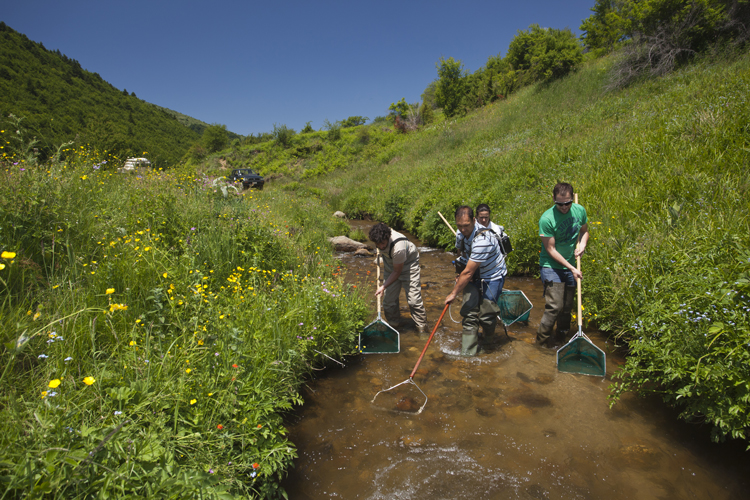In some parts of our planet, WWF’s vision of humans living in harmony with nature is embodied in quite a unique way. Lakes Mikri and Megali Prespa and the surrounding mountains form a rare kind of paradise for both humans and nature. After decades of tireless efforts, the Prespa basin—shared by three countries, Greece, Albania and FYROM—is today a model of local growth, joint management, international cooperation and environmental conservation.
The Prespa Basin
Prespa is an area of great ecological value , blessed by a rich natural environment and breathtaking landscape, birds, traditional settlements and remarkable Byzantine monuments. The most important characteristic, however, is that so many life forms are concentrated in this tiny part of land. Due to the area’s isolation, many of the rare species that it hosts are endemic of Prespa and/or of the Balkans, which means they can only be found there and in no other part of the world. In addition, it hosts the largest colony of Dalmatian pelicans—a species threatened with extinction—in the world.

© A. Bonetti / WWF Greece
On a national level, the area is protected by many national, European and international treaties and laws. Specifically, it was declared a National Park in 1974 and was later acknowledged as a Wetland of International Importance under the Ramsar Convention. On a transboundary level, by a joint declaration of the Prime Ministers of the countries that share the Prespa basin, the Transboundary Prespa Park was founded in 2000. It was the first transboundary protected area in the Balkans. Ten years later, in February 2010, the international agreement between the three states and the European Union aimed at improving the Park’s institutional operation initiated a new era for the Transboundary Prespa Park. The Park’s objective is to preserve the area’s natural environment through tri-state cooperation as well as to promote the prosperity of the local communities of all three countries.
Prespa is, nevertheless, more than its natural environment. It only takes a visitor a quick tour to recognize the rich cultural environment. The Prespa settlements, the remarkable examples of traditional architecture, the abandoned adobe houses and the religious monuments, including some of the most noteworthy examples of
Byzantine and post-Byzantine architecture, bear witness to the strong human presence in the area throughout history. This harmonious coexistence of nature and humans is a continuous source of inspiration in the efforts to conserve and protect the area.
The Society for the Protection of Prespa (SPP)
The Society for the Protection of Prespa (SPP) is a local non-profit environmental organization based in the village of Agios Germanos in Prespa. Founded in 1991, it was the first coordinated effort of various environmental organizations, including WWF, to protect the area. Dr. Luc Hoffmann, internationally known environmentalist and zoologist, Thymios Papayannis, architect and planner, (both also founders of WWF Greece) and Dr. Giorgos Catsadorakis, biologist, were among the people that decisively contributed to its founding. The formal initiative was undertaken by the Friends of Prespa and WWF International, and the SPP was created with the participation of WWF Greece and nine other Greek and foreign environmental organizations.
The SPP’s mission is to protect the natural and cultural heritage throughout the Prespa basin for the benefit of its inhabitants now and in the future. Its activity is based on the knowledge, understanding and perseverance of its people. With different expertise and with their love of Prespa, nature and humanity as common ground, the SPP people work in the field every day, analyze and process studies, mobilize and cooperate with institutions in promoting environmental issues. Nonetheless, nothing would be possible without the cooperation and participation of the Prespa residents and institutions.
Basic Principles of Operation of the SPP
Transboundary activity: Recognizing that the protection and sustainable development of the area requires the participation and harmonious cooperation of all three states that share the area (Greece, FYROM and Albania), the SPP focuses on developing projects on a transboundary level.
Cooperation with individuals and institutions: Close cooperation with the residents of Prespa and institutions on a local, national and transboundary level results in a shared understanding of the area’s issues and a joint development of sustainable solutions.
SPP Activity
The Society’s activities are diverse and cover all aspects of the protection of the area’s natural and cultural heritage. The SPP focuses its activity on:
- conserving wildlife habitats and biodiversity
- promoting sustainable development
- supporting the operation of the Transboundary Prespa Park
- supporting public and private institutions throughout the Prespa basin regarding issues of natural and cultural heritage protection raising awareness and disseminating information.

© A. Bonetti / WWF Greece
For more information on the SPP visit the Society’s website.
The SPP and its members have been awarded various honorary distinctions, specifically, the Ramsar Wetland Conservation Award (1999), the Goldman Prize (2001), the LIFE Nature projects “Best of the Best” award (2009) and the Byron Antipas Award of the Hellenic Society for the Protection of Nature (2013). The Society was also a finalist for the Thiess International Riverprize (2012).
More information:
Marianna Vlassi, SPP Communications and Fundraising Officer, This email address is being protected from spambots. You need JavaScript enabled to view it., 0030 210 3314893
Share this



